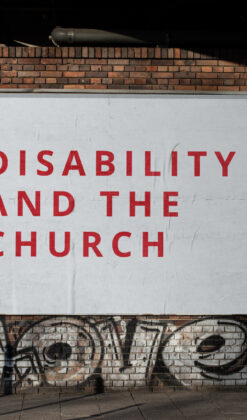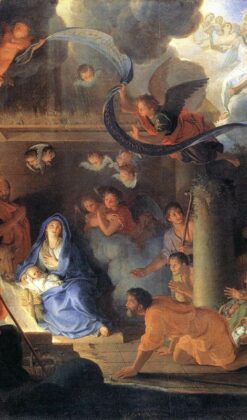Despite what is ubiquitously portrayed in nativity scenes, Christian folklore, and every English translation that I’m aware of, there’s a good chance that Jesus’ parents never visited an inn in Bethlehem to give birth to the Christ-child.
Here are three reasons why.
First, Bethlehem was a very small rural village at this time—population of only a few hundred people. Historically, then, it would be extremely unlikely that there was a commercial inn at such a small village. Inns existed in cities that attract travelers (merchants, religious pilgrims, etc.), or because the city is on major travel route and far from a large town. Bethlehem is neither. So it’s unlikely that there was some sort of ancient Motel 6 doing business in the village.
Second, unlike our American culture, families in ancient Palestine would be expected to host relatives during their travel. Since Joseph and Mary are originally from Bethlehem, they would have had lots of near and distant relatives there to stay with. Culturally, then, even if there was a Motel 6 in Bethlehem (which is unlikely), it would have been incredibly offensive for this Davidic couple to seek shelter there. They would have gone straight to the house of a relative.
But doesn’t the Bible say that they stayed at an inn? Well, not exactly.
Third, Luke 2:7 says: “Then she gave birth to her firstborn Son, and she wrapped Him snugly in cloth and laid Him in a feeding trough—because there was no room for them at the inn” (HCB), but the word for “inn” is kataluma, which can refer to a number of different types of lodging places. It can mean “inn” in the traditional sense, but it can also refer to a room (or spare room) in a house, and this latter meaning is probably what’s intended here in Luke 2. Luke does actually refer to an inn later in Luke 10:34 (where the Samaritan brought the half-dead man), but he uses a different word there: pandokeion (“inn”) and not kataluma. In fact, the only other time Luke uses kataluma is in Luke 22:11, where it clearly means a room in a house, not an inn.
Therefore, once we dig deeper into the historical, cultural, and linguistic background of Luke 2, it’s likely that Joseph and Mary went to the house of a relative to find refuge and deliver the child. However, upon arriving, they discovered that there was no room for them in this house—perhaps other relatives were already taking up the spare room, or perhaps it was a small, one room-house and it was already too crowded. Either way, Joseph had to take his pregnant wife to the stench-filled courtyard where the animals were kept to deliver the Messianic King.
Got time for some reasoned speculation?
If this interpretation is correct, and there is every reason to believe that it is, then why would the relatives of Joseph and Mary not give up their home or spare room to let Mary—a woman 9 months pregnant—give birth to her child? The text doesn’t say, but it is quite odd that Mary is forced to have the baby with the animals. Perhaps there is a subtle critique of such an inhospitable act. Maybe the family heard of Mary’s perceived immoral behavior—an unmarried 15 year old carrying a child—and so they kicked her to the curb, or out with the animals, to show the surrounding villagers that they did not approve of her immorality.
Now, none of this is conclusive, but the historical scenario does suggest it. If so, this gives deeper meaning to what John 1:11 will say of Jesus: “He came to his own, and his own people did not receive him.” This is of course true of Jesus’ rejection by the Jews, but it may well be foreshadowed here in his birth, when we was rejected by his own relatives before he was even born.
More proof, if proof were needed, that the incarnation was a radical act of grace, penetrating the depths of humility and shame.











